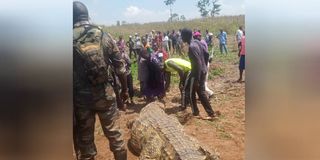Wildlife attacks: 24 Homa Bay families seek compensation from KWS

Ndhiwa residents view the carcass of a crocodile killed by Kenya Wildlife Service rangers on February 2, 2024, after it killed and swallowed an 11-year-old boy in Manyuru village in Homa Bay County.
What you need to know:
- KWS rangers later killed the crocodile in River Kuja and retrieved the body of the child after dissecting the reptile.
- Besides deaths and injuries, some families are seeking compensation after their crops were destroyed by animals.
At least 24 families in Homa Bay County are seeking compensation from the Kenya Wildlife Service (KWS) after their kin were attacked by wild animals under different circumstances resulting in deaths, injuries and destruction of property.
The families want KWS to pay them for the losses amidst concerns from fishermen in the county that the payment process takes too long. The cases were recorded over the past 12 months.
KWS county warden Jackson Kibor said the latest cases are of hippopotamus and crocodile attacks.
The hippo attack happened in Lambwe East location, Mbita Sub-county, last month where a 41-year-old fisherman was attacked and injured as he was fishing at Kisaka beach. He survived the attack but with a broken arm.
Another attack which involved an 11-year-old pupil and a crocodile in Ndhiwa last week however resulted in the death of the child.
KWS rangers later killed the crocodile in River Kuja and retrieved the body of the child after dissecting the reptile.
Besides deaths and injuries, some families are seeking compensation after their crops were destroyed by animals.
Most families seeking compensation for the destruction of crops are those whose maize or other crops were eaten by monkeys and baboons.
Mr Kibor said all the 24 cases are before the county wildlife compensation committee for consideration. Five of the cases involve death while the remaining 19 are bodily injuries.
"We have witnessed increased cases of human-wildlife conflict in the county with 24 cases being reported in one year. The committee is looking at the cases," he said.
County Beach Management Unit network chairman Edward Oremo accused KWS of delaying the process deliberately.
"Some families have lost hope along the way as they waited for compensation. Some relatives of victims, who should be paid die when waiting for the money which sometimes ends up not being paid," Mr Oremo said.
According to the beach management unit chairman, some fishermen have been seeking compensation for more than 10 years.
For the process to be successful, the KWS officer said some documents including medical and police reports must be filed properly.
"Sometimes some families fail to attach relevant documents on the compensation form making the process unable to complete. The forms can either be rejected or sent back to whoever filed them," Mr Kibor said.
He advised people living close to wildlife habitats to exercise caution when doing their daily activities.
"We will continue to hold sensitisation meetings with different communities and teach them how to co-exist with wildlife," Mr Kibor said.
He however cautioned the families that not all cases of deaths, injuries or crop destruction warrant automatic compensation.





